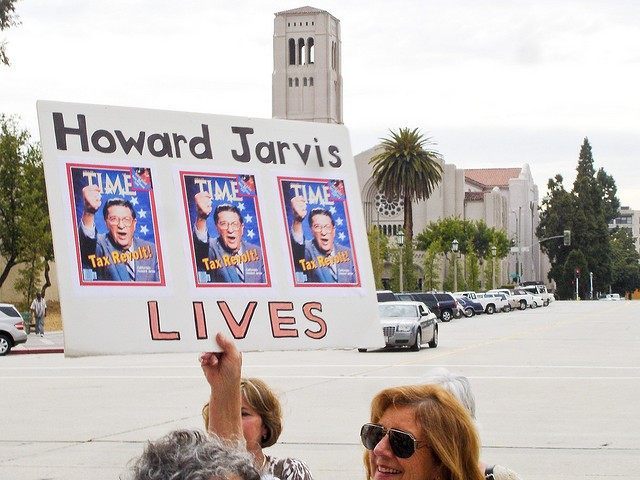Assemblyman Phil Ting (D-San Francisco) introduced union-backed Assembly Bill 1040 on Tuesday, which aims to reform–or destroy–California’s Proposition 13 by raising taxes on commercial properties.
Prop 13, a 1978 taxpayer initiative, has survived against three decades of Democrat political control due to popular homeowner support coupled with financial funding by commercial property interests. Once considered the “third rail” of California politics, unions joke that once they pass “split-roll” to cut off commercial property funding, all of Prop 13 will soon join President Ronald Reagan in his grave.
Voters rebelled against Governor Jerry Brown’s 1978 re-election campaign, which called for a wealth transfer from home owners to renters and the “under-privileged.” With California’s property tax annual rates of about 3 percent of market values and no limits on increases in ad valorem tax reassessments, property taxes on a compound basis essentially consumed the value of a California home in about 23 years.
In a concerted homeowner and commercial property taxpayer rebellion, nearly two-thirds of California’s voters passed Prop 13 on June 6th, 1978. The initiative slashed property tax rates on homes, businesses and farms by about 57 percent, or $7.4 billion.
The initiative also rolled back property values to the 1976 assessment level and set a 1 percent property tax rate on valuation. Prop 13 also restrained county assessors from raising assessments by more than 2 percent per year, as long as the property was not sold. Once sold, the property tax was calculated at 1 percent of the sale price, and a new 2 percent reassessment cap became applicable.
Proposition 13 set off a political earthquake that jolted the nation by galvanizing middle class voters to join a counter-revolution to progressives’ new world order. This populist effort set the stage for President Reagan’s 1981 income tax cuts and incited a nationwide tax revolt at the state and local levels. Within five years of Proposition 13’s passage, nearly half the states in the U.S. strapped similar straitjackets on politicians’ tax-raising capabilities. Almost all those tax limitations still remain in effect today.
California’s Democrat leadership has avoided taking on Prop 13 thus far. In late 2012, voters passed Proposition 30, just as Silicon Valley tech stocks exploded higher and hundreds of companies went public. As a result, residents of the Golden State saw their top marginal tax rate jump by 33%. With capital gains taxed at the same rates as income, up to 13.3 percent, California has the second highest marginal tax rate in the industrialized world, only behind socialist Denmark.
Because of Prop 30, the state’s tax collection through April was up $10 billion for the first 10 months of the fiscal year, mostly due to huge capital gains taxes. California’s collection of capital gains jumped from $4.7 billion in 2010, to 11.9 billion last year, and could hit $15 billion this year.
But with the annual cost for state employees’ salaries and benefits at $10 billion, any fall in capital gains collections would create the same type of disaster for public employee unions that happened in the Great Recession, when capital gains income to the state plunged from $10.9 billion in 2007 to $2.3 billion in 2009. In that crash, 6.7 percent of the state’s public employees were terminated, K-12 and early education was slashed by 8 percent, and public health and welfare were slashed.
The European and Asian financial crisis have reminded unions and Democrats that they are on borrowed time before the U.S. market corrects and capital gains evaporate.
The unions believe that if they can “divide and conquer” by convincing voters to eliminate Prop 13 protections for commercial property owners, they will generate a $4.5 billion increase in annual tax collections. If successful in their first fight, unions will be positioned to overturn Prop 13 homeowner protections and pick up another $11 billion in new taxes.

COMMENTS
Please let us know if you're having issues with commenting.